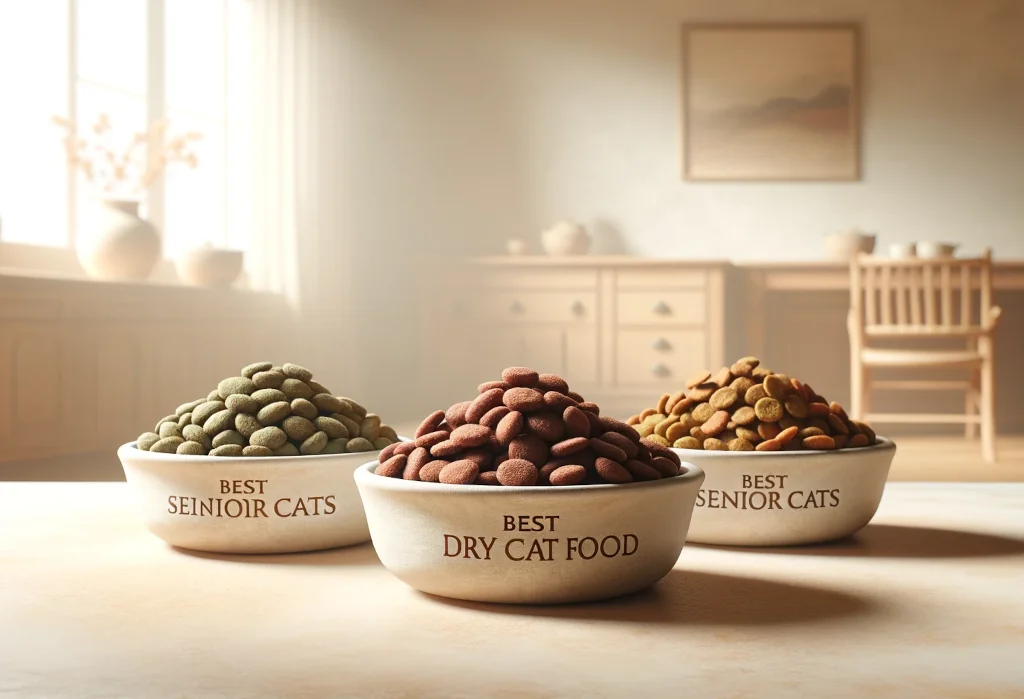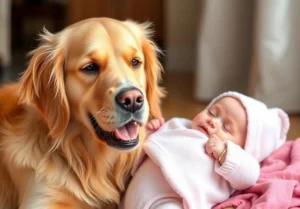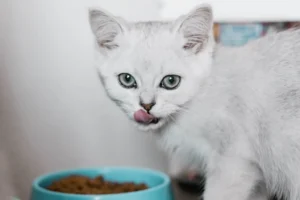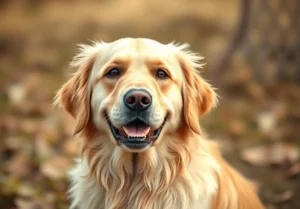Disclosure: We may earn a commission from helpful, relevant links in our content. No cost to you. See our privacy policy.

Watching your fur baby grow into their golden years can be both rewarding and a tad worrying. Their playful pounce might have slowed down, but guess what hasn’t? Their desire for a delish meal.
In this post, we’re serving up the details on the best dry cat food for your senior kitty, ensuring that their dietary needs are not just met, but also tantalizing their taste buds in the process.
Quick Takeaways:
- Transition to senior cat food between ages 7 to 10 to support their changing dietary needs, focusing on lower calorie intake and higher fiber for better digestion.
- Top picks for senior dry cat food include
- Encourage your senior cat to eat by warming their food, using appealing toppers like tuna broth, and offering meals in a quiet, secluded spot.
What Makes Senior Cat Food Different?
When our feline companions enter their golden years, their dietary needs start to shift. Senior cat food is different because it’s specifically tailored to cater to these changes, helping to maintain health, vitality, and quality of life during their senior stage. A common misconception is that senior cat food is simply “light” or less tasty versions of adult cat food. However, it’s much more than that.
Senior cat diets often have increased fiber to promote better digestion and prevent constipation, a common issue in older cats. They also tend to be lower in calories to help prevent weight gain, as seniors are usually less active.
However, this doesn’t mean they skimp on nutritional needs. On the contrary, these diets are enhanced with vital nutrients. Omega-3 fatty acids are a key component, supporting joint health and reducing inflammation, which is crucial as our furry friends might start feeling the ache of arthritis. Moreover, they’re formulated to support kidney health, a concern for many aging cats, and often have adjusted levels of phosphorus and sodium.
How Can You Tell It’s Time to Switch to Senior Cat Food?
Spotting the right time to switch to senior cat food isn’t always as clear-cut as celebrating a milestone birthday. Cats age at different rates, but most are considered senior by the age of 7 to 10. Watch for these signs as indicators it might be time to adjust their diet:
- Changes in Activity Level: If your once zippy cat now prefers lounging in the sun to chasing laser dots, it’s a signal their energy needs are changing.
- Weight Changes: Weight gain or loss can both be signs of aging and the need for a diet tweak.
- Dental Health Issues: Difficulty eating or interest loss in food can indicate dental pain, something a softer or specially formulated senior diet can alleviate.
- Veterinarian Recommendations: Always the best gauge, if your vet suggests it’s time, it’s time.
Transitioning should be a gradual process, mixing in the senior food with their regular diet until they fully adjust.
What are the Top Picks for Dry Senior Cat Food?
Choosing the right senior cat food can feel overwhelming with so many options available. Here are some of the top picks that cater to a variety of needs and preferences:
Hill’s Science Diet Senior 7+ Indoor Cat Dry Food : This diet is uniquely formulated for indoor senior cats. It provides a balanced diet with easy-to-digest ingredients and natural fibers to support digestion and nutrient absorption.
Blue Buffalo Wilderness Senior Chicken Recipe : High in protein and grain-free, this recipe is ideal for senior cats who are meat lovers at heart. It’s packed with omega-3 fatty acids for joint health and has a healthy dose of antioxidants for overall well-being.
Purina Pro Plan Prime Plus Adult 7+ Cat Food : Research-backed and scientifically formulated, this cat food includes a proprietary blend designed to improve and extend the life of cats aged 7+. It focuses on supporting key areas like immune health, kidney health, and maintaining a lean body mass.
An often overlooked but critical recommendation is the IAMS Proactive Health Healthy Senior Dry Cat Food, which contains essential nutrients including calcium and potassium to promote heart health, an aspect not all senior cat foods address specifically. It’s a masterful blend catering to the common and not-so-common needs of aging cats.
Choosing the best dry food for your senior cat involves considering their individual health requirements, taste preferences, and even their lifestyle (indoor vs. outdoor). Always consult with your veterinarian before making a switch, especially if your cat has specific health issues. With the right diet, your senior cat can enjoy their golden years with the vitality and health they deserve.
Certainly! Here’s how these sections might look in your blog post, optimizing for reader engagement and SEO standards:
Are Grain-Free or Prescription Diets Better for Senior Cats?
Choosing the right diet for your senior cat can be a balancing act. You want to provide them with nutrition that supports their aging bodies, but it can be tough to sift through all the options out there. Grain-free and prescription diets have both become popular choices, but which one is the best for your elderly feline friend?
Grain-Free Diets : These have been marketed as a more “natural” alternative to traditional cat food. The theory goes that since wild cats don’t consume grains, our domestic friends shouldn’t either. However, it’s essential to understand that grain-free doesn’t always mean low carb or higher quality. In fact, some grain-free diets replace grains with other fillers that might not be any better for your cat. If your cat doesn’t have a grain allergy, this diet might not offer any significant benefits.
Prescription Diets : These are specifically formulated to address health issues like kidney disease, diabetes, and digestive problems, which are common in senior cats. If your vet has diagnosed your cat with a specific health condition, a prescription diet can make a world of difference by focusing on nutritional needs specific to their ailment.
Here’s the catch though: always consult with your vet before transitioning to a specialized diet. They can offer advice tailored to your cat’s specific health profile.
Here’s a little nugget of wisdom most articles miss: Cats, especially seniors, can be notoriously picky eaters, and sudden changes in their diet might upset them more than their stomachs. Whatever diet you choose, introduce it gradually to give your cat time to adjust.
How Much Should You Feed Your Senior Cat?
Just like humans, cats often need fewer calories as they age. Senior cats are generally less active and have a slower metabolism, so it’s crucial to adjust their diet to prevent weight gain, which can lead to a host of health issues.
Here’s how you can adjust portion sizes and feeding frequencies for your senior cat:
-
Calculate their caloric needs : This might seem daunting, but there are plenty of online calculators that can give you a ballpark figure based on your cat’s weight, age, and activity level.
-
Consider meal frequency : Many senior cats benefit from more frequent, smaller meals throughout the day to keep their metabolism steady.
-
Monitor and adjust : Keep an eye on your cat’s weight and body condition, adjusting their portion sizes as needed. A good practice is a monthly weigh-in.
-
Consult your vet : They can provide guidance tailored to your cat, especially if they have a medical condition affecting their dietary needs.
And, remember, while adjusting their diet, also consider light exercise to help keep them at a healthy weight. Laser pointers, feather wands, or even slowly moving a string across the floor can stimulate their natural hunting instincts and get them moving.
Tips for Encouraging Your Senior Cat to Eat
Is your senior cat turning their nose up at their food? Here are some tips to encourage them to dive back into their meals:
-
Warm up their food : Just like us, cats find warm food more appealing because it smells stronger. Warming their meal to about body temperature can make it more enticing.
-
Try food toppers : Sprinkling a bit of tuna or chicken broth over their food can make it irresistible. Just make sure any toppers you use are cat-friendly and low in sodium.
-
Mind the texture : Senior cats may have dental issues making it hard for them to chew. Softening their dry food with a bit of water or opting for pate-style wet foods can help.
Unique tip alert : If your senior cat is particularly finicky, try offering them meals in a quiet, secluded spot. As cats age, they can become more sensitive to noise and movement, making them feel vulnerable during meal times. Providing them with a calm eating environment can encourage them to eat more regularly.
Remember, these are just starting points. The most important thing is to keep a close eye on your senior cat’s eating habits and consult with your vet if you notice any significant changes.
By following these tips and keeping in touch with your vet, you can help ensure that your senior cat continues to enjoy their meals and maintains a healthy weight as they age.
Alex, a passionate animal lover, has experience in training and understanding animal behavior. As a proud pet parent to two dogs and three cats, he founded AnimalReport.net to share insights from animal experts and expand his knowledge of the animal kingdom.




